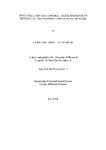Discourse, care and control : an ethnography of residential and nursing home elder care work
| dc.contributor.supervisor | Abbott, Pamela | |
| dc.contributor.author | Lee-Treweek, Geraldine Anne | |
| dc.contributor.other | School of Health Professions | en_US |
| dc.date.accessioned | 2011-05-11T09:12:59Z | |
| dc.date.accessioned | 2011-10-12T15:50:10Z | |
| dc.date.available | 2011-05-11T09:12:59Z | |
| dc.date.available | 2011-10-12T15:50:10Z | |
| dc.date.issued | 1994 | |
| dc.identifier | Not available | en_US |
| dc.identifier.uri | http://hdl.handle.net/10026.1/362 | |
| dc.description | Metadata merged with duplicate record (http://hdl.handle.net/10026.1/877) on 20.12.2016 by CS (TIS). | |
| dc.description | This is a digitised version of a thesis that was deposited in the University Library. If you are the author please contact PEARL Admin (pearladmin@plymouth.ac.uk) to discuss options. | |
| dc.description.abstract |
This thesis presents the notion that paid elder care work is often more involved with ordering individuals, than caring for them. It discusses this issue via ethnographic data about care assistant and nursing auxiliary work, which was collected in two elder care homes: Hazelford Lodge residential home and Bracken Court nursing home. The thesis uses care, control, and knowledge as the main themes for the discussion of work in both homes. The first chapter sites the thesis within the context of the academic literature on the discourses of the body, the nature of care work and residential care. It focuses especially upon care work as body labour. Chapter two presents the ethnographic methodological approach of the thesis, in two sections. Firstly, the use of the Foucauldian notion of discourse is explained, and secondly, the research process and research relationships are explored through a reflexive account. Chapters two and three present social, structural and spatial aspects of the two settings. They discuss the different ways in which the homes were organised, and that spaces were utilised and had different meanings, within the homes. Chapters four and five are based upon data from Hazelford Lodge residential home, and illustrate the care assistants' work as centred upon created order in the home, based upon the typification of residents and others. Chapters six and seven explore the auxiliaries' work in Bracken Court and present three control issues as central to their jobs. Firstly the overt ordering of patients around spaces in the home. Secondly, the normalisation of individuals into patient, and objects, of body work. Thirdly, the auxiliaries' resistance to heir role and status. Chapter eight compares the work of the assistants and auxiliaries in terms of resident and patient construction, the nature of the two forms of work, their knowledge, and lastly, their constructions of place and status. The thesis argues that both groups of workers are involved in ordering bodies that they perceive to be problematic and degenerating. In Hazelford Lodge order and discipline is practised as care and in Bracken Court the auxiliaries use more overt forms of control, but both 'caring' and controlling are effective methods of creating order. By introducing notions of body labour and ordering, the thesis presents a unique critique of paid care. | en_US |
| dc.language.iso | en | en_US |
| dc.publisher | University of Plymouth | en_US |
| dc.subject | Medical Care | |
| dc.subject | Nursing Home | |
| dc.subject | Ethnography | |
| dc.subject | Elderly Care | en_US |
| dc.title | Discourse, care and control : an ethnography of residential and nursing home elder care work | en_US |
| dc.type | Thesis | |
| dc.identifier.doi | http://dx.doi.org/10.24382/4832 | |
| dc.identifier.doi | http://dx.doi.org/10.24382/4832 |
Files in this item
This item appears in the following Collection(s)
-
01 Research Theses Main Collection
Research Theses Main


